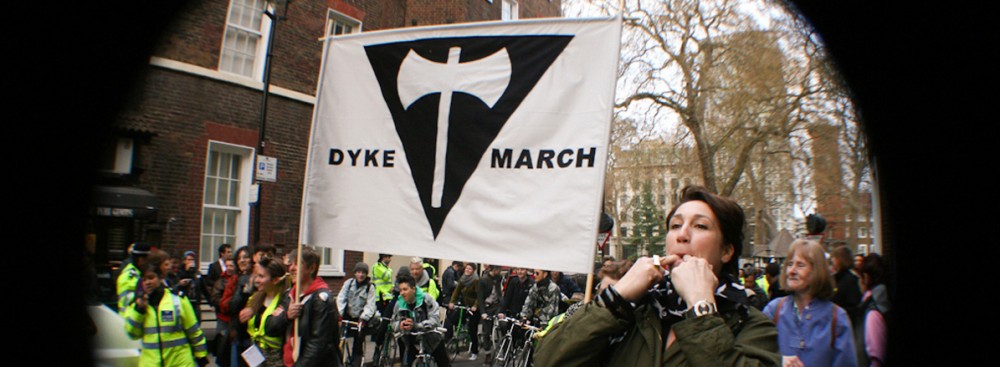In 1992, Lesbians Talk Queer Notions was published. This was part of a book series exploring lesbian lives published by the now defunct feminist publishing house Scarlet Press. In this text, a diverse group of activists, artists and academics sought to flesh out the new queer turn.
They asked:
What is this queer politics? Does the new defiance signal a meaningful shift in ideology, or is it merely the wishful thinking of a few white gay men? Are queer politics and feminism in any way compatible? What does queer mean for lesbians, and who is setting the agenda? Is queer a positive alliance or a watering down of lesbian strength? Is there a queer aesthetic?
Some of us participated in these discussions and remember the emergence of the word ‘queer’ into the landscape of lesbian, gay, transgender and feminist politics. For others, queer has formed our political consciousness, shaped our identities and informed who and how we love, fuck and live.
For some who identify as queer, the word lesbian carries particular associations: it is aligned with a different time and place, a different community and a politic many no longer feel is relevant. It is seen to be linked to a ‘second wave’ feminist position, caricatured as white, middle class, anti-trans and anti-sex work. More often than not in current queer discourse lesbians just aren’t mentioned at all. Yet in working class communities – many of which are racialised – the word lesbian has a very different kind of baggage.
For some, the label lesbian is a source of political power. Recent events such as April 2012’s Dyke March London mark a revaluing of lesbian politics, its propaganda referencing the Lesbian Strength marches of the late 1980s. Similarly, Canadian artist Allyson Mitchell’s Deep Lez project seeks to explore lesbianism as a site of potentially radical identification and strategy for queer politics.
As the subcultural turn to archive meets new technologies of documentation, it sometimes feels like we’re archiving our lives – in all their drama, community, beauty, banality and rage – even as we’re living them. Yet, in asserting and recording our queerness in realtime, we have a tendency to gloss over our lesbian herstories.
In the spirit of Lesbians Talk Queer Notions, we might ask: What is the source of this wilful amnesia? Is it aesthetics, politics or something else? What are we scared of in our collective and personal pasts? After all, many of us ‘came out’ as lesbians long before we identified as queer. What is lost and what is gained in the individual and collective turn to queerness? And what might we gain from engaging with our lesbian roots? And is there such a difference between the two? How do trans politics relate to lesbian politics, in the present and in the past? How do our organising strategies build on and diverge from those employed by earlier movements? Do we organise, create and engage intergenerationally and across the borders of race and nationality?
I’m interested in interviews, essays, reviews of the Lesbians Talk books series, dialogues, narratives, photographs, comic strips, collages or anything else that can be printed in book form that addresses the relationship between queer and lesbian politics, particularly submissions that address issues of race, disability, class, migration and activism.
Though this project specifically seeks to address the resonances between queer and lesbian identities, it welcomes submissions from anyone, regardless of gender or sexuality.
Written submissions must be less than 3000 words.
Contributors may wish to read ‘Lesbians Talk Queer Notions.’ It is available cheaply here.
Please send a proposal of less than 300 words by 15th April 2013 to queerstalk@gmail.com.
If you’re interested but don’t know where to start, here are a few thoughts:
Read Lesbians Talk Queer Notions as a jumping off point
Lesbians, queers and ‘third wave’ feminism.
Addressing racism in queer communities; how do our strategies differ from our lesbian counterparts?
Queer perspectives on lesbian separatism
The DIY ethos across lesbian and queer communities
Lesbian and queer perspectives on pornography
Third wave feminisms and the repudiation of the second wave
Deep Lez
Transmen and butches
The politics of pronouns
Transwomen in queercommunity?


Pingback: Leeds Queer Film Festival | Queers Talk Lesbian Notions: The Callout
Small correction: It’s “trans”, followed by a space, then “woman”. Trans women are women who are trans, just as women can be bisexual women or running women – not biwomen and runningwomen. (I don’t speak for men, though afaik there are different conventions.)
Women are females, lesbians are females the rest are just ‘ queer’ this kind of redesigning of Dyke is dangerous and miss leading! Women refuse to be defined by men!
Interested in the question mark there – would you be interested in submissions concerning trans women, or not? It’s rather concerning to be contemplating an anthology with the word “lesbian” in the title which by default more time on trans men than trans women – though that does rather reflect the trans-misogynistic nature of much modern queer community.
Thanks for the comment, Cel. The question mark was meant to be a reference to the transmisogyny, not a continuation of it! Though I can very much see how it came across as such. I am very much interested in submissions regarding transwomen. Apologies for the unclear phrasing. I’ll leave the post as it is in the interests of transparency.